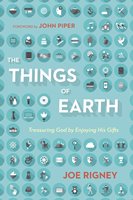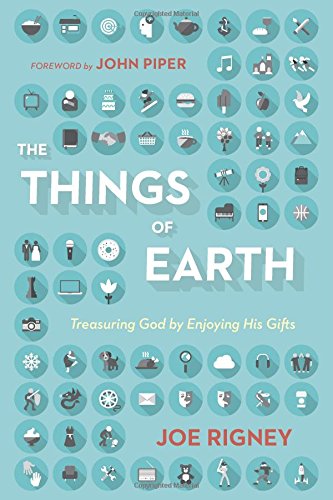Crossway has just released a new book by Joe Rigney (assistant professor of theology and worldview at Bethlehem College and Seminary, Minneapolis) that explores a subject that is seldom addressed at any length at all. Scripture tells us to delight in God alone, and it warns us against idolizing his good gifts … but it also encourages us to enjoy them! Just how do we put all this together?
Augustine offers some very helpful biblical insights here, as do Jonathan Edwards, C.S. Lewis, and John Piper. But few if any have explored the question at such depth. Rigney’s approach is profoundly theological and eminently practical, and today he talks to us about his subject.
Books At a Glance (Fred Zaspel):
Let’s begin big: explain for us briefly why God created the world. This is huge, I realize, but it’s a foundational consideration in your book. What was God’s purpose in creating? What did he set out to accomplish by it?
 Rigney:
Rigney:
This is a huge question. Many of us have learned that the simple, biblical answer is that he created for his own glory. The more difficult question is to unpack precisely what this means. Following Jonathan Edwards, I argue that God created the world in order to invite us to participate in his own Trinitarian fullness. Or, to put it another way, God’s goal in creation is to glorify himself by extending his own glory so that his divine life comes to exist in a creaturely form, that is, in our knowing, loving, and rejoicing in the Father, Son, and Holy Spirit. That’s a mouthful, and difficult to wrap our minds around. The key thing to remember is that, because God is triune, his glory must be triune. Because God is fundamentally a relational being, his glory is fundamentally relational. Glory is something that is eternally shared among the members of the Godhead and which they then share with us.
Books At a Glance:
What prompted you to write this book?
Rigney:
I wrote this book mainly out of my own experience. Ever since I embraced the truth that God glorifies himself through my satisfaction in him, I’ve wanted to live my life with a single-minded passion for him. The challenge was that I often felt that creation, the things of earth, were a distraction from this pursuit of God. I felt a constant, low-grade, vague sense of guilt that I wasn’t loving God “enough” or that I was loving his gifts “too much.” This guilt was very undefined, but it robbed me of a lot of joy. At one level, I knew that I wasn’t thinking rightly about God’s gifts, but I couldn’t put my finger on it. Over the years, I discovered that others felt a similar sense of guilt about their enjoyment of God’s creation. I also saw how this kind of vague guilt could lead to dislocations in our relationships because of a well-intentioned (but I believe misguided) fear of idolatry. The issues seemed big enough that I began to really try to wrestle with the Scriptures on this question. And I received a lot of help from the writings of Jonathan Edwards, C.S. Lewis, John Piper, and Doug Wilson.
Books At a Glance:
At the heart of your book is your call to “embrace our creatureliness.” Can you summarize for us briefly what you mean by this?
Rigney:
Put simply, I mean that we shouldn’t view our finitude as a defect. We are creatures; we exist in time, we exist in space, we exist in bodies. All of these are good, and they continue to be good after the fall. This means that our finitude is not something to be overcome or transcended. Expanded, perhaps, or enlarged, but not abolished or done away with. This means, among other things, that we shouldn’t feel guilty because we don’t love God infinitely. We’re creatures. We don’t do anything infinitely. Instead, God calls us to love him supremely and fully (which is not the same thing). Of course, because of our sin, we still fail even at that, but there’s a massive difference between being condemned because we’re sinful and being condemned because we’re creatures.
Perhaps the only other thing to say about embracing our creatureliness is that the heart of being a creature is receiving. God is fundamentally a Giver, and we receive life, breath, and everything from him. I think that gratitude and faith are the postures of the soul that best reflect our identity as receivers.
Books At a Glance:
Explain for us how loving God ought to show itself in our attitude toward “things.” How can a right enjoyment and appreciation of earthy pleasures be in fact a dimension of our worship of God?
Rigney:
The simple question is: What are all the things there for? Why do they exist? And the answer is that they exist to display God and to invite us into his triune fullness. They are, in the words of Jonathan Edwards, “images of divine things.” Or, as C.S. Lewis once wrote, every pleasure has the capacity to be a tiny theophany, a revelation of the living God. Therefore, if we’re going to deeply and rightly worship God, we must engage with the world that he’s made. So we shouldn’t rush our enjoyment of his gifts. They are made to reveal him, to create categories in our minds and hearts for knowing him. If we approach created things that way, we’ll find that we are freed to deeply enjoy them and that they serve our highest joy in God himself.
Books At a Glance:
So then, there is a sense in which we ought to love and enjoy God’s gifts more than we already do? And in fact by these things we ought to love God more?
Rigney:
That’s exactly right. I’m arguing that when it comes to our enjoyment of God’s gifts, we need to be rooted in a supreme and full and expanding love for God himself, and then we need to take the governor off. If a created thing shoots your joy through the roof, let it ride; it’s carrying your joy in God along with it. The more you enjoy your family or your friends or your food, the greater capacities you’ll have for worship and adoration of the Giver of all good things. Or, as I somewhat provocatively say in the book, assuming you love God supremely, it’s impossible to love God’s gifts too much. I think that’s a statement that’s worth wrestling with.
 Books At a Glance:
Books At a Glance:
Okay, but frankly, that is more easily said than done. Recognizing that our fallen hearts are “idol factories” (as Calvin so famously put it), this might seem at least a bit unrealistic to some. So how can we keep ourselves from turning God’s good gifts into idols? You can’t reproduce large sections of your book, here, of course, but can you give us a few guidelines that might guard and guide our hearts?
Rigney:
Doug Wilson has helpfully talked about “anchor points.” Direct engagement with God, whether in prayer or Bible reading or corporate worship, is a necessary anchor for a right love of his gifts (just as a right engagement with his gifts is a necessary aid for genuine worship). So I have a chapter called “Rhythms of Godwardness” that tries to lay out the way that God intends temporal beings like us to engage with him both directly and indirectly.
Another guideline would be to think of idolatry in terms of trajectory. Where does your love of creation take you? Does the tickle fight with your kids intensify your gratitude and love to God? Or does it replace him? If the latter, then you’re probably sinfully separating the gift from the Giver, which I argue is the heart of idolatry. We receive the gift and then, because we refuse to honor God as God and give thanks, we turn the gift into a god, and we fall headlong into rebellion and idolatry. On the flip side, if every meal becomes an invitation to “Taste and see that the Lord is good” by tasting and seeing that ham and potatoes and pumpkin pie is good, you’re on the right track.
Books At a Glance:
You’ve said that this book is both dependent on the work of John Piper and an extension of it. Would you explain that for us?
Rigney:
For me, embracing a passion for the supremacy of God in all things is what created the tension between God and his gifts, the tension between “the supremacy of God” and the “all things.” As I say in the book, Christian Hedonists are going to have Christian Hedonist problems. As soon as you start singing, “Hallelujah! All I have is Christ” or proclaiming “On earth there is nothing I desire besides you,” you’re immediately confronted with the fact that your family or friends are standing next to you in church and you know deep down that you do love and desire them.
For the last 30+ years, John has pressed the biblical message of God’s supremacy home to so many of us. I essentially want to push this message into the creaturely corners. I wanted to write a book that gladly and gratefully stands on John’s shoulders and tries to see more deeply into the dynamics of how creation fits with God’s purposes for us. And because of my deep respect for John, and because we share the same foundational commitment to let all of the Scriptures speak, I knew that I needed to write a book commending a robust delight in God’s gifts that also enhances generosity, promotes missions, and that stands true even when all of the gifts are stripped away through suffering and death. That’s why I’m so grateful for John’s generous endorsement of the finished product.
Editor’s Note: See what John Piper has to say about this book here.

